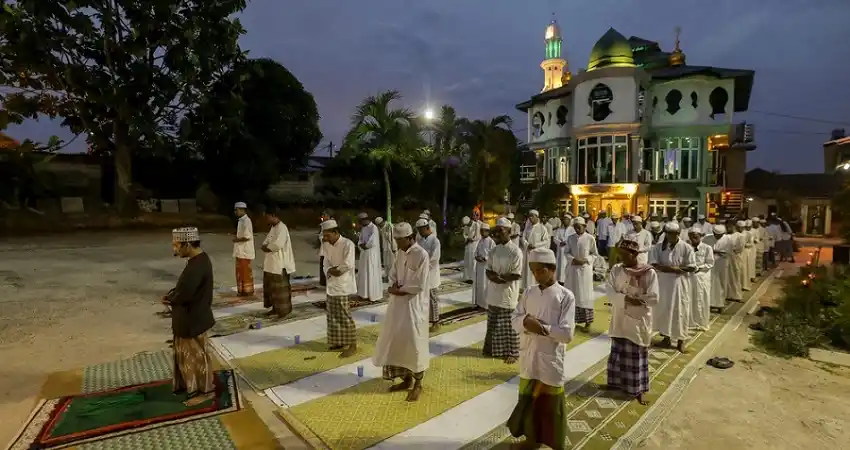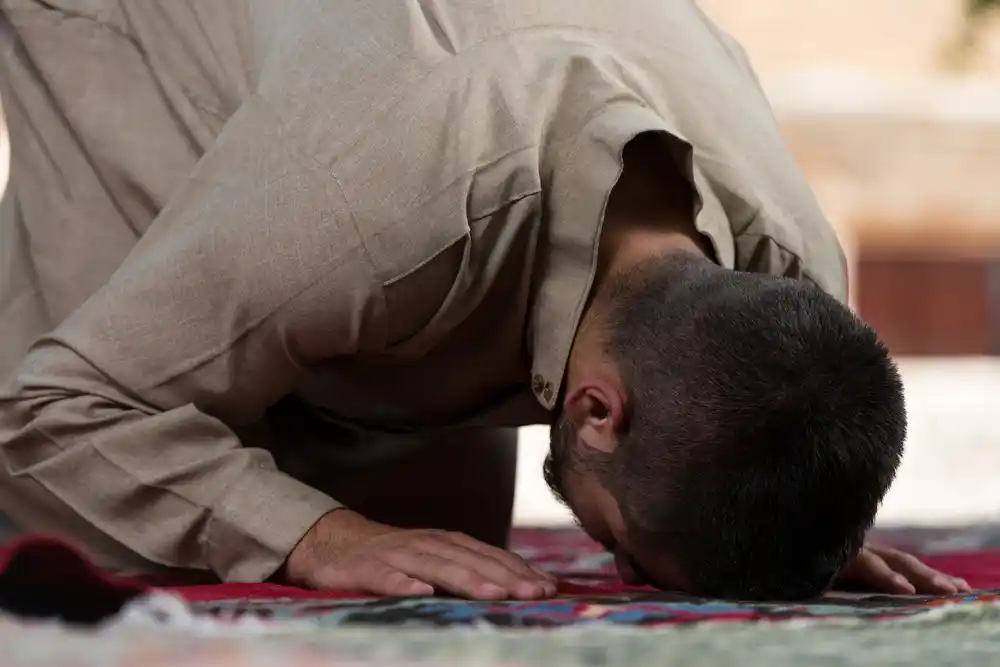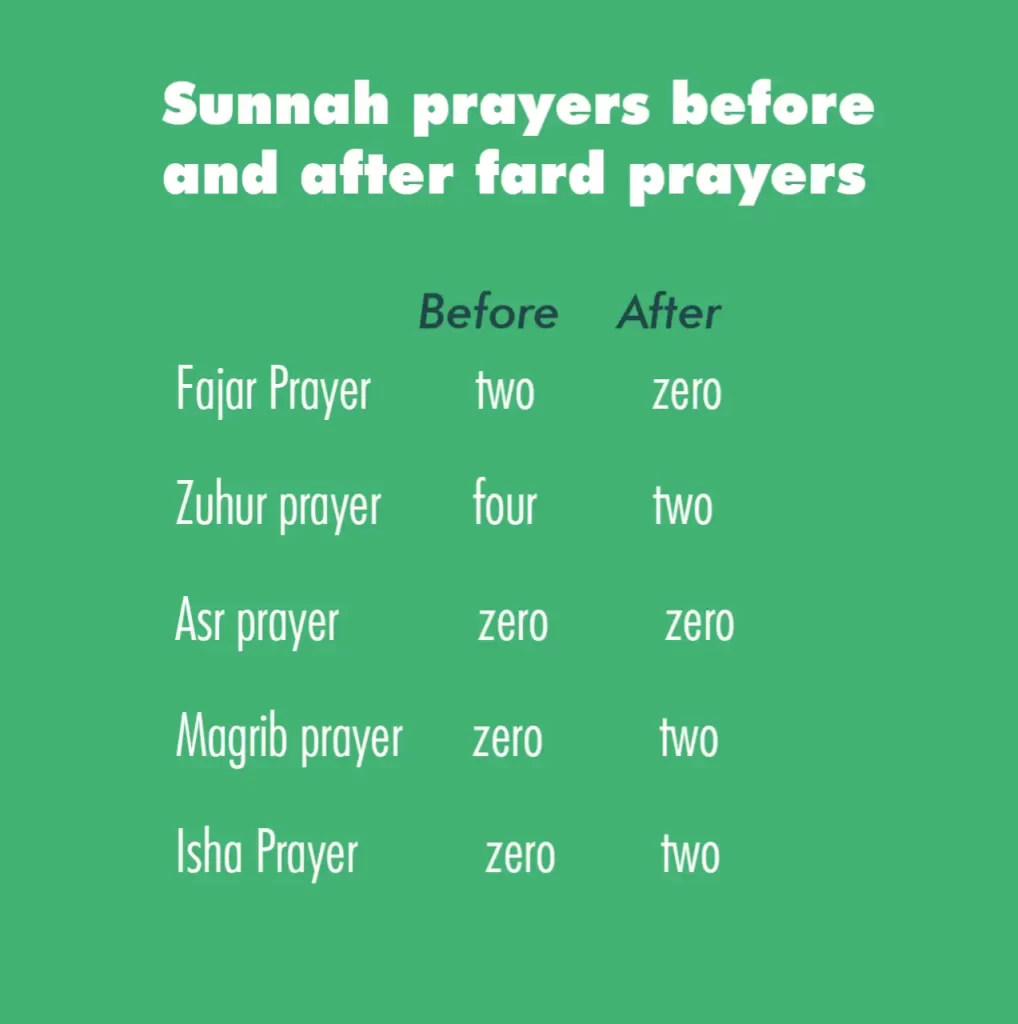We have crafted a comprehensive guide to Sunnah Prayers that is designed to provide you with all the information you need to know about these special prayers. Our guide is packed with detailed information that will help you understand the importance of Sunnah Prayers and how to perform them correctly.
What are Sunnah Prayers?
The Sunnahs of the five daily prayers is the legal Sunnah prayers before or after the obligatory prayers of the five daily prayers, which follow those obligatory prayers so that it is not prescribed for a Muslim to perform them alone. So we will get to know How to pray Sunnah Prayers.
Importance of Sunnah Prayers
Performing Sunnah Prayers is considered to be a way of following in the footsteps of the Prophet Muhammad (peace be upon him) and can lead to increased spiritual rewards. Sunnah Prayers also serve as a reminder to Muslims of the importance of prayer in their daily lives.
Why Should You Perform Sunnah Prayers?
The importance of Sunnah prayers is that it. Making up for deficiency in the obligatory prayer, as supererogatory prayer is one of the acts that make up for the deficiency in the obligatory prayer, so the Messenger, may Allah’s prayers and peace be upon him, was keen to teach Muslims How to Perform Sunnah Prayers.
Types of Sunnah Prayers

After we got acquainted with the virtue of performing the Sunnah prayer, as well as How to pray Sunnah Prayers, we move to the sections of the Sunnah prayer, as the sunnah is divided into two parts:
Sunnahs Rawatib
Sunnahs Rawatib are called the Sunnahs Rawatib because their origin of them is continuity and continuity, and they are also the Sunnahs of others, including the Sunnahs of the five obligatory duties.
Which are divided into pre and post; It is not prescribed to perform the Sunnah of prayers alone without the statutes that were legislated with it. Sunnahs Rawatib is also divided into two parts: the tribal Sunnahs; are the Sunnahs that are prayed before the obligatory prayer, and they are six rak’ahs: two rak’ahs before the Fajr prayer.
And four rak’ahs with two Taslims before noon, and their time begins with the prayer time entering until the person begins the obligatory prayer.
Sunnahs badia; They are the Sunnahs that is prayed after the obligatory prayer, and they also number six rak’ahs, namely: two rak’ahs after Maghrib, two rak’ahs after dinner, and two rak’ahs in the afternoon, and their time starts from the time the obligatory prayer is completed until the time for the obligatory prayer ends.
For example:
- The Sunnah of Fajr: Two rak’ahs are enacted for it before the obligatory prayer of Fajr by consensus of the jurists, and the Sunnah of Fajr is one of the most confirmed and best of the Sunnahs.
- The Sunnah of Dhuhr: The minimum of which is two rak’ahs before the obligatory prayer and two rak’ahs after it according to the majority of Hanafi, Shafi’i, and Hanbali jurists, and the best among them is four rak’ahs before it and two rak’ahs after it with one Tasleem.
- The Sunnah of Asr: There is no regular Sunnah for the Asr prayer, but it is desirable to perform four rak’ahs before the Asr prayer, with the agreement of all jurists.
- The Sunnah of Maghrib: They are two rak’ahs after the Maghrib prayer, according to the agreement of the jurists, and it is desirable to increase it to six rak’ahs according to the Hanafis and Malikis.
- The Sunnah of isha prayer: two rak’ahs after dinner, and it is desirable to perform four rak’ahs before it, and four rak’ahs after it.
Sunnah Nafilah
The Sunnah Nafilah are the Sunnahs that are not affiliated with others, and examples of them are the Sunnah of Duha, the Sunnah of qiyam ulail, and others.
What benefits of offering Sunnah Prayers?
After we finished explaining How to pray Sunnah Prayers in detail, we move on to the virtue and benefits of performing the Sunnah:
- Exaltation in Paradise Frequent prayer is one of the deeds that raise the ranks of a person in Paradise on the Day of Resurrection.
- Preparing for worship Ibn Daqeeq Al-Eid mentioned in his statement that supererogatory prayers should be given precedence over the obligatory ones, that this is from the door of intimacy with worship and preparation for it.
- Building a house in Paradise The supererogatory prayer is one of the reasons for obtaining a great reward with Allah in Paradise, in a reason for building a house for its owner in Paradise.
- Drawing closer to Allah urged Islam to perform supererogatory prayers; Because of the increase in man’s closeness to his Lord.
- Prohibition of the body on fire
It came in Sunan Abi Dawud on the authority of Umm Habib Yabah, that the Messenger of Allah – may Allah’s prayers and peace be upon him – said.
Whoever memorizes four rak’ahs before noon, and four after it, is forbidden to Hell. And Sheikh Al-Albani corrected it.
- Better than the world and what is in it, and it was stated in the virtue of the two rak’ahs of dawn what was narrated by the Companions, including the hadith of Mrs.
Aisha – may Allah be pleased with her – that the Prophet, may Allah’s prayers and peace be upon him, said: The two rak’ahs of dawn are better than the world and what is in it. narrated by Muslims.
How to Perform Sunnah Prayers

Performing Sunnah prayers is relatively easy and straightforward. Below, we will guide you through the process of performing the Sunnah prayers step by step.
-
Make the intention: Before starting the prayer, make the intention in your heart to perform the Sunnah prayer.
-
Perform the ablution: Perform the ablution (Wudu) as you would before any other prayer.
-
Stand up straight and face the Qiblah: Stand up straight, facing the direction of the Kaaba in Mecca.
-
Begin the prayer: Start the prayer by raising your hands to your ears and saying “Allahu Akbar” (Allah is the greatest).
-
Recite the opening supplication: After starting the prayer, recite the opening supplication “Subhanaka Allahumma Wa Bihamdika Wa Tabarakasmuka Wa Ta’ala Jadduka Wa La Ilaha Ghairuka” (Glory be to You, O Allah, and all praises are due unto You, and blessed is Your name and high is Your majesty and none is worthy of worship but You).
-
Recite Surah Al-Fatiha: Recite Surah Al-Fatiha, the first chapter of the Quran.
-
Perform Ruku: After reciting Surah Al-Fatiha, bow down in Ruku and recite “Subhana Rabbiyal Azeem” (Glory be to my Lord, the Greatest).
-
Stand up straight: Stand up straight after the Ruku and recite “Sami Allahu liman hamidah” (Allah hears those who praise Him).
-
Perform Sujud: After standing up straight, perform Sujud (prostration) and recite “Subhana Rabbiyal A’la” (Glory be to my Lord, the Highest).
-
Sit back up: Sit back up after performing the Sujud and recite “Rabbighfirli” (O Allah, forgive me).
-
Repeat steps 7-10: Repeat steps 7-10 to complete the first cycle of the Sunnah prayer.
-
Recite Tashahhud: After completing the first cycle of the Sunnah prayer, sit down and recite the Tashahhud.
-
Recite Durood Ibrahim: After reciting the Tashahhud, recite Durood Ibrahim.
-
Repeat steps 7-13: Repeat steps 7-13 to complete the second cycle of the Sunnah prayer.
-
Complete the prayer: After completing the second cycle, turn your face to the right and say “Assalamu alaikum wa rahmatullah” (Peace be upon you and the mercy of Allah), and then turn your face to the left
Tips For Performing Sunnah Prayers
And in response to How to Perform Sunnah Prayers, in the opinion of Sunnah Briers, as that the Sunnah prayer is performed as the obligatory prayer performed with its pillars, conditions, and Sunnahs.
As for the time of the Sunnah prayer, it is every time of the night and day, and it is permissible for a Muslim to pray the Sunnah except for the times of dislike. So he prays two rak’ahs, two rak’ahs, or four rak’ahs, with one Tasleem, or six rak’ahs, or eight rak’ahs, or more or less than that.
Recommended reading: What is Sunnah in Islam?
Conclusion
In conclusion, the performance of Sunnahs in salah has a very great virtue for the Muslim, so we discussed in our article How to Perform Sunnah Prayers, just as the Sunnah prayer begins with the entry of the obligatory time.
Sunnah Prayers FAQs
What do you recite in Sunnah prayers?
The Prophet - may Allah’s prayers and peace be upon him - if he prayed, he would read after Surah Al-Fatihah something from the Holy Qur’an. And therefore the project is for whoever wants to pray something from the supererogatory prayers, whether at night or during the day. To read after Surah Al-Fatihah something from the Holy Qur’an, but that is not considered obligatory in his right, so the Muslim is not obligated to read anything from the Holy Qur’an in prayer except Surat Al-Fatihah
Can I pray the Sunnah prayer anytime?
The time of the Sunnah rawatib starts from the beginning of the time of the obligatory prayer related to it, so the time of the Zuhr prayer, for example, starts from the time of the beginning of the Dhuhr prayer.

